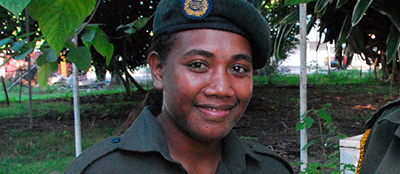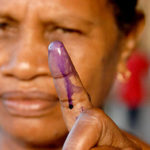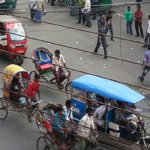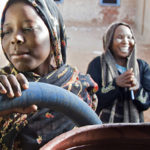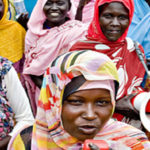A number of studies quantitatively find a strong correlation between levels of gender inequality and conflict. They find that gender inequality increases the likelihood that a state will have internal conflict and international disputes. There is substantial evidence that traditional patriarchal gender identities lead to militaristic and violent conflict approaches. Women ...» more
Governance
Political systems
Political systems are the formal and informal political processes by which decisions are made concerning the use, production and distribution of resources in any given society. Formal political institutions can determine the process for electing leaders; the roles and responsibilities of the executive and legislature; the organisation of political representation (through ...» more
Operational models for politically aware subnational government projects
Research for this report was unable to identify specific literature relating to political awareness for subnational projects, although there is currently research being undertaken on this topic. Consequently, rather than outlining existing operational models, this rapid research report takes a broader focus and identifies approaches and examples that can provide insights into ...» more
Targeting groups at risk of extremism through security and justice programming
Several governments and NGOs are engaged in domestic and foreign 'countering violent extremism' (CVE) programming in the security and justice fields. USAID and the Danish government have been particularly active in this area. CVE activities are often divided into: hard power approaches (military, legislative, policing, infrastructure protection, crisis planning, border ...» more
Decentralisation and local government
Estimates suggest that decentralisation is being pursued in over 80% of developing countries worldwide. For many people, local government is the part of government that most directly impacts on their lives, particularly via the provision of services like water, sanitation, and primary education and healthcare. Further resources The following resources were included in GSDRC's ...» more
Service delivery
Equitable access to essential public services is vital for human development, inclusive growth, and tackling persistent inequality. This topic guide provides an overview of the best available evidence on inclusive service delivery. It includes lessons from cases where aid has been effective at addressing weak front-line incentives, where services have been delivered in very ...» more
Gender-related results in security and justice policy and programming
There is a paucity of evidence that examines the overall impacts of security and justice programming on gender-related results in the two areas of this query. The literature available tends to be donor funded evaluations and policy papers, it tends to be fragmented, and it tends to examine programmes on a case-by-case basis. Security and justice programing is highly context ...» more
Alternative dispute resolution for businesses in developing countries
Dispute resolution mechanisms can be arranged in a continuum. At one end are processes like which are formal, inflexible, and adversarial, and which depend on neutral third parties to decide the outcome of the process, such as litigation in court, where the outcome is decided by a judge. At the other end are increasingly informal, flexible, and consensual processes such as ...» more
Contemporary conflict analysis of Iraq
This paper notes that conflict in Iraq has become increasingly sectarian, and has affected minorities the most. Among its findings it highlights roots of the violence: Sunni alienation following the ‘sectarianisation’ of the political system; feelings of insecurity as a result of sectarian militias and the increasingly Shia make-up of the Iraqi Security Forces; and structural ...» more
Political party development in Ukraine
There are a combination of institutional and structural factors that account for party development in Ukraine. They include: The weakness of ideology in political parties Poor incentives for party institutionalisation due to the design and instability of the institutional rules of the game Extensive use of state administrative resources by regime-supported parties The ...» more
Donor action on women’s employment in ASEAN countries
Donors have attempted little to improve women’s participation and conditions in the ASEAN workforce. Isolated cases highlight some findings: Success stories include donors action through: national policies (Cambodia); mandatory monitoring of working conditions (Cambodia); gender-sensitive design and evaluation of projects (Viet Nam, Cambodia); capacity development for ...» more
Inclusive institutions
Institutions are the formal and informal rules and norms that structure citizens’ rights, entitlements, opportunities and voice. How can policymakers and practitioners support inclusive institutions to promote development that ‘leaves no-one behind’? What do we know about what has – or hasn't – worked, and where? This Topic Guide synthesises the evidence, debates and approaches ...» more
Sequencing reforms in fragile states
How can governments in fragile and conflict affected states (FCAS) plan and manage reforms when everything is urgent and important, and when capacity and resources are low? How can external actors strategically support the fulfilment of essential and expected state functions? This Topic Guide provides an overview of the evidence that examines the sequencing of statebuilding and ...» more
Faith-based organisations, conflict resolution and anti-corruption
This rapid report reviews the literature on faith-based development organisations (FBOs) and their role in conflict resolution and anti-corruption. In both areas the literature suggests that religious actors could play a decisive role, but that this has not been realised. The evidence on FBOs and conflict resolution is moderately robust. Nearly all literature provides case ...» more
Strategic communications and foreign fighters
Key Findings: There is limited coverage of strategic communications programmes specifically aiming to prevent the recruitment of citizens who travel to conflict zones to become foreign fighters. There is relatively more coverage of strategic communications with respect to broader counter-radicalisation or countering violent extremism (CVE) approaches, but there are few case ...» more
Incentives for gender responsive budgeting
It is difficult to conclusively evaluate the impact of gender responsive budgeting (GRB) on gender outcomes and in turn the impact of incentives on GRB and on women’s empowerment more widely. This is both due to a limited evidence base about impact and to the complexity in assessing and interpreting impact (Combaz, 2013). Literature on GRB is primarily prescriptive and there ...» more
Community-driven development and indigenous, ethnic minority, and disability issues
Few CDD programmes explicitly address minority issues. Many programmes target vulnerable groups such as women, youth, disabled, ethnic minorities, but as one group rather than distinguishing their differing needs. Few programmes are targeted specifically at vulnerable groups alone. Many programmes focus on reducing poverty and vulnerability, with the implicit assumption that ...» more
Voice, empowerment and accountability
Voice, empowerment and accountability (VEA) interventions aim to support poor and marginalised people to build the resources, assets, and capabilities they need to exercise greater choice and control over their own development, and to hold decision-makers to account. This guide provides an overview of the best available evidence on the impact of VEA interventions. It identifies ...» more
Lessons from confidence building measures
When designing CBMs, lessons include: Link CBMs to wider peace- and state-building processes or negotiations; locally design CBMs according to local context; use CBMs in situations where trust is low; start CBMs in non-controversial, or symbolic, issue areas; design CBMs with long-term, incremental approaches; combine several CBMs at different track levels, and in different ...» more
Dealing with election-related violence in fragile and conflict-affected states
There are a number of causes of election-related violence, which can occur at different stages of the electoral cycle. Dealing with this violence very much depends on understanding these causes and tailoring measures to address them. This report draws on guidance material, evaluation literature and empirical studies to provide a brief overview of measures to prevent and address ...» more
